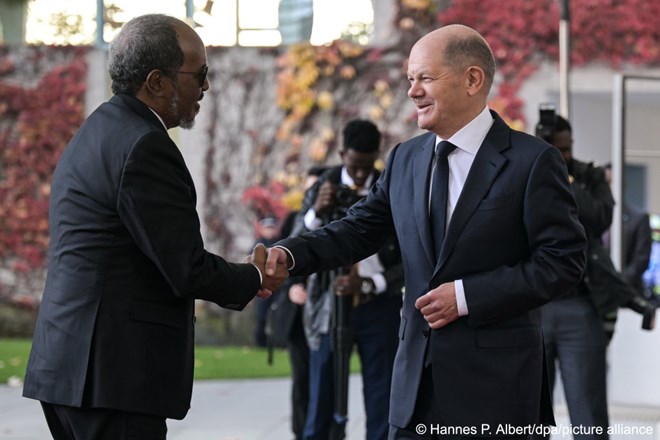
Marion MacGregor
Wednesday November 13, 2024

Somalia’s president, Hassan Sheikh Mohamud, discussed return cooperation with the German chancellor, Olaf Scholz, in Berlin on November 5-6, 2024 | Photo: Hannes P Albert / picture alliance
An agreement between Germany and Somalia announced last week is receiving mixed responses. Similar deals to send migrants back have proved difficult and ineffective, says a researcher.
German Chancellor Olaf Scholz and President Hassan Sheikh Mohamud of Somalia said after meeting in Berlin last Wednesday (November 6), that there would be more returns to Somalia of people without a right to remain in Germany.
Since then questions have arisen about that agreement, with the two leaders seeming to hold different views about whether they meant Somalis would be forcibly sent home.
In a joint press conference Scholz said "only a small number (of Somalis) are not permitted to remain (in Germany) but of course the rule that they have to be repatriated applies to them."
But a statement attributed to Hassan Sheikh Mohamud later suggested that the agreement did not mean Somalis should be deported but applied to those who want to return home voluntarily.
Posted on the X platform by Somali government spokesperson Farhan Jimale it said: "There is no need for forced repatriation; however, for individuals who, under the law, no longer hold the right to asylum, exhausted all their options and wish to return voluntarily, our doors are always open."
One social media user pointed out that this contradicted the way the deal had been reported in Germany, while others responded angrily and accused the president of lying and failing to provide solutions to those displaced within Somalia.
Another person asked on X. "How about the 10 million dollars he got from this sordid deal?"
The comments show the problems that poorer countries in Africa often face when negotiating repatriation agreements with governments in the EU, highlighting the unequal power relations that usually underpin such deals.
Return cooperation 'bargaining chip'Increasingly, Europe is demanding that countries in Africa reduce migrant departures and agree to take back their nationals, in exchange for continued financial support.
Somalia, as a country that is emerging slowly from conflict and instability, relies heavily on the EU and Germany for aid and development funds. This makes cooperation on repatriations one of the president’s strongest barganing chips, says Judith Altrogge, a researcher at Germany’s Osnabrück University.
At the same time, leaders like Hassan Sheikh Mohamud risk facing anger at home if migration cooperation deals fail to deliver for their own people.
"There are good reasons to be highly sceptical whether Somalia has the capacity to care for (returnees) now or in the near future," says Altrogge.
"Somalia faces severe challenges to provide social and economic security for its citizens even without the extra challenges that deported migrants bring."
A specialist on return migration in Gambia, Altrogge pointed out that a return cooperation process, begun with the EU in 2017 after the removal of dictator Yahya Jammeh, backfired badly on the transitional government when people blamed their leaders for failing to meet the needs of the vulnerable deportees. "In their eyes, the government's engagement in the cooperation agreement adhered more to the interests of the destination country than their own citizens."
Public opposition in Gambia posed such a threat to the government’s survival that it put a freeze on further deportations from EU countries. The ban would not last for long, however. Just like Somalia, Gambia’s number one partner in development cooperation is the EU.
No increase in deportations
When it comes to bilateral migration partnerships, the agreement between Germany and Somalia follows similar deals with Kenya, Morocco and Georgia. In each case, the number of potential returnees is relatively small.
The main reason that countries of origin engage in such deals is generally something else, like developing pathways for more legal migration in the case of Kenya, or increasing diplomatic leverage and access to aid funds, as in the case of Morocco.
The German government has focused on the necessity of reaching agreements with origin countries to boost deportations. Yet in most cases, with the exception of Gambia, these partnerships have not led to higher numbers of returnees, says Altrogge.
As the partnership agreements are also non-binding, she suggests the Somalia deal should be seen as a starting point for further negotiations, not only between Somalia and Germany, but also between the government and civil society in Somalia, creating further challenges for the building of trust after years of conflict.